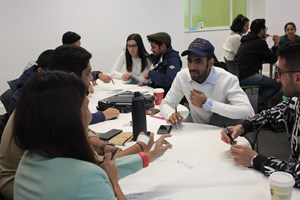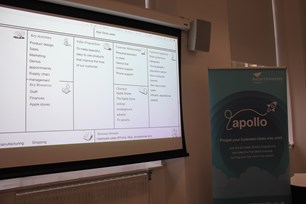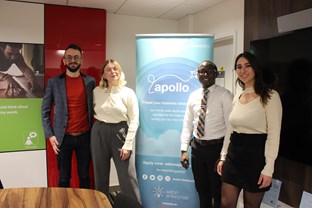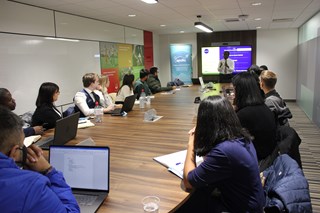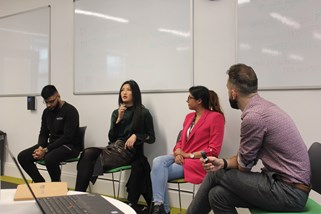Group Size
?
1.) Small group (teams of 4-6)
2.) Individual Task
3.) Large Group
4.) Any
Small group (teams of 4-6), Large Group
Learning Environment
?
1.) Lecture Theatre
2.) Presentation Space
3.) Carousel Tables (small working group)
4.) Any
5.) Outside
6.) Special
Presentation Space, Carousel Tables (small working group)
QAA Enterprise Theme(s)
?
1.) Creativity and Innovation
2.) Opportunity recognition, creation and evaluation
3.) Decision making supported by critical analysis and judgement
4.) Implementation of ideas through leadership and management
5.) Reflection and Action
6.) Interpersonal Skills
7.) Communication and Strategy
1Creativity and Innovation
2Opportunity recognition‚ creation and evaluation
5Reflection and Action
6Interpersonal Skills
7Communication and Strategy
When we designed the Apollo programme, we had several aims in mind.
Apollo is pre-start-up support programme – we also refer to it as a ‘mini accelerator’.
The 6 week programme is intended to help roughly 30 current Aston University students ‘propel their ideas into orbit’. We felt that we had a wealth of activity at the beginning of the student journey of enterprise/entrepreneurship, such as inspirational talks, panels, and other one-off short activities. We also have been running a student/graduate incubator for 10 years, enabling those individuals who had validated ideas to launch businesses with our support when they are ready to do so – so we felt this part of the journey was also covered.
So, we have developed Apollo to support students in between these two stages to validate and move forward with their ideas, via masterclasses and guest entrepreneur insight. Therefore also strengthening our enterprise pipeline for our learners.
The programme is delivered in partnership with Edvent and supported via funding from Santander Universities.
The Apollo programme was originally designed and delivered in Autumn 2018, as part of a larger activity plan funded by the Santander Universities 10th Anniversary Fund. It has been delivered 5 times to date, with one of those taking place entirely online due to the Covid pandemic.
The programme was purposefully made available to students at any level (from Foundation to PhD), as we wanted to facilitate collaboration across disciplines and level of study. Students submitted an online application, and then from there we selected 30-35 individuals to take part.
Before delivery, we spent time with our programme partner (Edvent – led by CEO Mark Corbett) to examine the gaps in our current provision as well as get his input on the key topics a programme should cover.
The result was a 6-week programme, covering the following topics:
1. Thinking Differently; Learn to Problem Solve; Embrace Divergent/Convergent Thinking
2. Discovering your customer; Know your Customer; Validate your Market
3. Going Lean; Understand Lean; Build a Brand
4. Nailing your Business Model; Crack the Business Model Canvas; Understand How to be Innovative
5. Securing Funding; Understand Value of Revenue; Embrace Variety of Funding Sources
6. Crafting the Pitch; Practice Being a Great Pitcher; Deliver your Business Pitch
Sessions took place every Wednesday afternoon for 3 hours, and followed the same rough format:
Masterclass (mixture of lecture-style delivery of information, interactive group activities and individual work)
Guest Entrepreneur (Talk/Panels)
Reflection/Group Work/Networking
Guest entrepreneurs were largely drawn from the local business community and chosen to highlight a wide range of businesses and founders. We wanted to present a diversity of sector, stage of business, founder profile, and so on. Entrepreneurs were approached according to that weekly topic, so that they would have some experience in that area to share their real-world experiences.
The entrepreneurs participate via panels, ‘fireside chats’/Q&A, and 1:1 speed mentoring.
The final session (Pitching) has been hosted at a Birmingham City Centre branch of Santander (who are also partners in the programme). We have invited staff from Santander to sit on a panel to hear the students’ pitches, to provide constructive and encouraging feedback. Again, this also provides the element of getting out of the classroom and into a more professional setting. Pitches are recorded and the videos provided to students for them to review and learn from.
At the end of the 6 weeks, students are given a certificate of participation and signposted towards our other relevant activities to help them build on what they’ve started.
In between weekly sessions, we encouraged interaction and learning to continue in several ways. Resources were shared via Box and participants encouraged to recap in between sessions. We set relevant weekly tasks, and those who completed them were incentivised by the offer of more in-depth feedback and 1:1 support from our facilitator Mark. We also set up a WhatsApp group for the students to continue their conversations and provided recommended reading.
Examples of weekly tasks:
Impact:
The impact on both our students’ journeys and our programme of activity has been significant. We feel it has successfully filled a gap in our offering as a team to Aston students.
36 participants have successfully joined our BSEEN incubator and launched their businesses.
Learner Feedback:
From our 2019 programme, students gave the experience an average of 9.5 out of 10.
In 2018/19, 78% of participants were from a widening participation background.
As part of our original objectives, we anticipated that the programme would help those who would go on to then start a business in a short timeframe, but also those who would take the knowledge and refined skills into employment. For example:
“Apollo certainly helped impact me when I’m preparing for my interviews such as how i can sell myself as a “business” as well as understanding the customer segmentation that the company is targeting. Apollo was a great platform for me to gain practical skills to entrepreneurship and I will certainly be using it in a few years’ time as I’m building capital and network now”. [James Chew, 2019 Participant]
